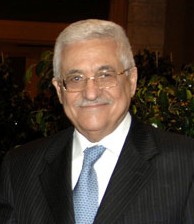Abbas blames Hamas for delaying Palestinian reconciliation
 Cairo - Palestinian President Mahmoud Abbas said Tuesday that Hamas had "put obstacles in the path of the reconciliation" between rival Palestinian factions.
Cairo - Palestinian President Mahmoud Abbas said Tuesday that Hamas had "put obstacles in the path of the reconciliation" between rival Palestinian factions.
Abbas was speaking to reporters after meeting with Egyptian President Hosny Mubarak in Cairo. Abbas' Fatah faction, which controls Palestinian-administered territories of the West Bank, last Wednesday unilaterally signed an Egyptian-brokered compromise agreement to end the two-year-old split with Hamas.
"We agreed on the pact with no amendments for two reasons: our trust and respect for the Egyptian side, and because we are devoted to Palestinian reconciliation," Abbas said Tuesday.
Fatah announced it would sign the agreement a day after Hamas accused Egypt of torturing Youssef Abu Zuhr, brother of Hamas spokesman Sami Abu Zuhr, to death while in custody the previous day. Egypt denied he had been tortured, saying he died of natural causes.
Hamas has asked for more time to consider signing the reconciliation agreement.
Among the sticking points is the conduct and timing of fresh presidential and parliamentary elections. The 25-page reconciliation pact Fatah signed calls for Palestinian presidential and parliamentary elections to be held on June 28.
But Abbas on Tuesday said he would issue a presidential decree calling for elections to be held in January.
"The Palestinian constitution requires us to issue this decree, and this is what we are planning to do, so that elections will be held before January 25," Abbas told reporters in Cairo.
In the 2006 Palestinian parliamentary elections, half the seats were chosen directly, by district. Hamas, which did not contest the previous elections in 1996, won 74 out of
132 legislative seats in total, to Fatah's 45. An additional four seats went to independents backed by Hamas.
In the contest for the 66 seats chosen by district, Hamas won 45 seats, to Fatah's 17. Independents affiliated with Hamas won additional four seats.
But Fatah fared better in the contest for the remaining 66 seats chosen proportionally, through "homeland lists," winning 28 seats to Hamas' 29.
The Egyptian compromise proposal signed by Fatah last week raised the number of seats to be elected proportionally to 75 per cent of the total.
Hamas has sought to keep at least 40 per cent of the seats to be chosen by direct vote by district.
A reconciliation agreement might pave the way for a lifting of the blockade of the Gaza Strip, imposed in 2007 after Hamas forcibly took control of security in the enclave from security forces loyal to Fatah.
It might also help speed the arrival of billions of dollars of international reconstruction aid to Gaza. Many international donors have stipulated that no aid must be allowed to fall into the hands of Hamas, which the United States and the European Union list as a terrorist organisation.
A single Palestinian government might also help international efforts to restart stalled Israeli-Palestinian peace talks by allowing for a unified Palestinian negotiating position. (dpa)